Ginkgo Biloba for Mental Sharpness: Ancient Herb, Modern Science
Introduction
For thousands of years, healers in ancient China used the leaves of the Ginkgo Biloba tree — one of the oldest living species on Earth — to enhance mental clarity, support memory, and boost longevity.
Today, modern science confirms that this ancient botanical may indeed sharpen the mind by improving blood flow, oxygen delivery, and neuron communication. Whether you’re looking to focus better, protect your brain from aging, or stay sharp through stressful days, Ginkgo Biloba remains one of nature’s most studied and promising cognitive herbs. 🧠✨
This comprehensive article explores how Ginkgo works, the science behind its benefits, optimal supplementation strategies, and how to combine it with breathwork, therapy, and other brain-supporting habits to maximize your mental edge.
Looking for supplements for Brain Fog? Click here.
🌳 The Ancient Origins of Ginkgo Biloba
Ginkgo Biloba, often called a “living fossil,” dates back over 270 million years, surviving through ice ages, volcanic eruptions, and modern pollution.
In Traditional Chinese Medicine (TCM), Ginkgo was used to:
Support blood circulation and energy flow (Qi)
Improve memory and focus
Treat dizziness, fatigue, and respiratory issues
Its resilience mirrors its benefits for the human brain: endurance, adaptability, and strength against oxidative and environmental stress. 🌏
🧬 How Ginkgo Works: The Science of Sharpness

Modern research reveals that Ginkgo’s mental benefits stem from a blend of unique bioactive compounds — primarily flavonoids and terpenoids, which work through several biological mechanisms.
🩸 Enhancing Blood Flow and Oxygenation
The brain is an oxygen-hungry organ, and even slight reductions in circulation can cloud thinking. Ginkgo improves microcirculation — especially in the capillaries of the brain — by dilating blood vessels and reducing platelet stickiness.
Result:
⚡ More oxygen and nutrients → faster mental processing and better memory formation.
🧠 Neurotransmitter Modulation
Ginkgo helps regulate acetylcholine, serotonin, dopamine, and norepinephrine — key neurotransmitters involved in learning, focus, and mood.
This helps stabilize energy and emotion, promoting calm alertness rather than overstimulation.
🧩 Antioxidant Protection
The brain’s high oxygen use makes it vulnerable to oxidative stress. Ginkgo’s flavonoids neutralize free radicals and protect neuronal membranes — particularly in the hippocampus, the center of memory.
In simple terms: Ginkgo keeps your neurons young and resilient. 💎
🧠 The Cognitive Benefits of Ginkgo Biloba
Hundreds of studies have explored Ginkgo’s impact on memory, attention, and cognitive performance.
🧩 Memory Enhancement
Ginkgo supports both short- and long-term memory by improving communication between neurons and enhancing synaptic plasticity — your brain’s ability to learn and adapt.
A 2011 meta-analysis in Psychopharmacology found significant improvement in working memory and recall in adults taking standardized Ginkgo extracts compared to placebo.
⚡ Mental Processing Speed
By improving blood flow and reducing oxidative stress, Ginkgo helps neurons fire more efficiently, translating to quicker reaction times and sharper decision-making.
🌙 Cognitive Protection During Aging
Several long-term studies show that Ginkgo may slow age-related cognitive decline. In people with mild cognitive impairment, regular use has been associated with improved daily functioning and better attention span.
💭 Mood and Motivation
Ginkgo mildly increases dopamine and serotonin levels, supporting a stable mood and reducing mental fatigue. Many users report feeling clearer, calmer, and more focused.
🧬 The Research: What Science Says
Ginkgo is among the most extensively researched herbs in the world.
A 2012 review in Frontiers in Aging Neuroscience concluded that Ginkgo extract (EGb 761) significantly improved cognitive performance and daily living skills in older adults.
A 2017 study in Human Psychopharmacology found that Ginkgo improved attention and working memory in healthy young adults after just 6 weeks.
MRI studies reveal enhanced cerebral blood flow after Ginkgo supplementation, especially in brain regions responsible for memory and focus.
🌿 In short: Ginkgo supports the biological roots of sharpness — circulation, energy, and neuronal resilience.
🔋 Ginkgo and Mitochondrial Energy
Every thought, decision, and creative idea burns energy at the cellular level. Ginkgo boosts mitochondrial efficiency, allowing neurons to produce ATP more effectively.
This mitochondrial support reduces mental fatigue and keeps your brain alert, especially during long hours of cognitive work or emotional strain.
That’s why many people describe Ginkgo as producing “smooth, clean energy” — focus without overstimulation.
⚖️ Ginkgo and Stress Balance
Chronic stress depletes energy, increases inflammation, and impairs memory. Ginkgo acts as a stress buffer, regulating cortisol levels and protecting the brain from stress-related oxidation.
When combined with mindfulness or breathwork, Ginkgo helps restore balance between the sympathetic (fight-or-flight) and parasympathetic (rest-and-digest) systems.
The result: sharper focus and greater emotional resilience. 🧘
💊 Supplementation: How to Take Ginkgo Biloba
🌿 Recommended Dosage
Standard extract: 120–240 mg per day
Divided doses: 60–120 mg in the morning and again in the afternoon
Clinical studies typically use EGb 761, a standardized extract containing 24% flavone glycosides and 6% terpene lactones.
🕓 Timing
Take Ginkgo with breakfast or lunch — it supports daytime focus and may interfere with sleep if taken too late.
🧩 Duration
Consistent use for at least 4–8 weeks is key to seeing measurable improvements in memory and mental performance.
Looking for supplements for Brain Fog? Click here.
🧘 Ginkgo and Brain Circulation: A Natural Nootropic
Unlike stimulants, Ginkgo enhances mental sharpness through better circulation and oxygenation, not artificial arousal.
Think of it as a “neurovascular tune-up.”
The better your brain’s microcirculation, the faster and cleaner your thoughts become.
That’s why Ginkgo is often described as a natural nootropic — a substance that optimizes cognition without dependency or crash.
🌬️ Breathwork: Amplifying Oxygen Flow
Since Ginkgo enhances blood flow and oxygen delivery, combining it with breathwork can magnify its benefits.
Conscious breathing practices improve carbon dioxide balance and oxygen efficiency, directly fueling mitochondrial energy.
Try the “4-7-8” Technique:
Inhale through your nose for 4 seconds.
Hold for 7 seconds.
Exhale slowly for 8 seconds.
Repeat 4–5 cycles.
This exercise increases oxygen exchange, activates the parasympathetic nervous system, and complements Ginkgo’s circulation-boosting effects.
Together, they enhance mental clarity and calm alertness. 🌬️✨
Want to try Breathwork? Click Here.
🧘 Ginkgo and Therapy: Improving Cognitive Flexibility
Therapy strengthens emotional intelligence and resilience — but these changes depend on neural plasticity.
By improving blood flow and nutrient delivery to the brain, Ginkgo can enhance the effects of psychotherapy, mindfulness, or cognitive training.
Benefits include:
🧩 Faster integration of emotional insights
💭 Greater concentration during sessions
🌿 Reduced anxiety and mental fatigue after deep emotional work
When therapy meets physiology, growth happens more efficiently.
Looking for online therapy ? Click Here.
🧠 Ginkgo and Neuroplasticity

Neuroplasticity — the brain’s ability to form and reorganize synaptic connections — is the foundation of learning and recovery.
Ginkgo supports this process by:
Boosting BDNF (Brain-Derived Neurotrophic Factor) levels
Protecting synapses from oxidative damage
Maintaining healthy blood flow in learning-related brain regions
This makes Ginkgo valuable not just for memory maintenance, but for mental agility — the ability to learn, adapt, and solve problems creatively.
💭 Ginkgo for Anxiety and Emotional Stability
Because Ginkgo modulates serotonin and GABA activity, it can reduce mild anxiety and irritability.
In a 2007 study in J Psychopharmacol, participants with generalized anxiety disorder who took 240 mg/day of Ginkgo experienced significant reductions in anxiety scores compared to placebo.
It doesn’t sedate — it stabilizes. Ginkgo helps your mind remain calmly alert, even in stressful or overstimulating situations.
🧘 Antioxidant Synergy: Pairing Ginkgo with Other Nutrients
Ginkgo’s antioxidant properties pair beautifully with other brain-protective compounds:
| Nutrient | Synergy |
|---|---|
| CoQ10 🔋 | Enhances mitochondrial energy and oxygen use |
| Alpha-Lipoic Acid (ALA) 🧪 | Regenerates other antioxidants like vitamin C and E |
| Omega-3s (DHA/EPA) 🐟 | Supports membrane integrity and neuron flexibility |
| Magnesium Glycinate ⚖️ | Calms the nervous system, reduces excitability |
| B Vitamins (especially B6, B12, Folate) ⚡ | Fuel neurotransmitter synthesis |
This combination creates a neuroprotective network — your daily shield against brain fatigue and decline.
🧩 Ginkgo and Exercise: Fuel for the Active Brain
Aerobic exercise naturally increases blood flow, and Ginkgo amplifies this effect.
A 2018 study showed that combining Ginkgo supplementation with moderate exercise improved reaction time and mental accuracy more than exercise alone.
Together, they create a feedback loop of vitality:
🫀 Exercise increases circulation → Ginkgo enhances it → more oxygen → sharper mind.
💤 Ginkgo and Sleep Quality
While primarily known for daytime sharpness, Ginkgo can also improve sleep quality in some individuals by stabilizing the stress response.
It helps lower nighttime cortisol and may enhance REM sleep, which supports memory consolidation.
If taken early in the day, it improves next-day mental clarity without disrupting nighttime rest. 😴
🌿 Who Can Benefit Most from Ginkgo Biloba?
Ginkgo is suitable for many groups:
🧑🎓 Students and professionals: Boosts learning, focus, and retention.
🧘 High-stress individuals: Reduces anxiety and mental fatigue.
👵 Older adults: Protects against cognitive decline.
🏃 Athletes: Supports focus and oxygen use.
💼 Creative professionals: Enhances flow state and sustained attention.
⚠️ Safety and Side Effects
Ginkgo is generally well-tolerated, but it’s important to use it properly.
✅ Safe Dosage Range
120–240 mg per day of standardized extract.
⚠️ Possible Side Effects (Rare)
Mild digestive upset
Headache (usually from poor hydration)
Slight increase in bleeding risk (avoid combining with blood thinners)
Pregnant or nursing women and those scheduled for surgery should consult their doctor before use.
🧘 Daily Routine for Maximum Sharpness
| Time | Practice | Benefit |
|---|---|---|
| ☀️ Morning | 120 mg Ginkgo + light breakfast | Increases blood flow and focus |
| 🌬️ Midday | 4-7-8 breathing exercise | Balances oxygen and stress levels |
| 🧘 Afternoon | Therapy or mindfulness session | Enhances learning and retention |
| 🌙 Night | Magnesium + hydration | Supports relaxation and recovery |
Consistency builds clarity — the longer you support your brain, the sharper it becomes. ⚡
🌈 The Long-Term Vision: Brain Longevity
Ginkgo isn’t just about today’s focus; it’s about lifelong cognitive vitality.
By combining:
Regular supplementation
Antioxidant-rich diet
Adequate sleep
Mindfulness or therapy
—you create a brain environment where clarity, creativity, and calm coexist naturally.
This is how ancient wisdom meets modern neuroscience: through daily practices that keep the mind young, adaptable, and resilient.
🧩 Key Takeaways
✅ Ginkgo Biloba enhances memory, focus, and circulation.
✅ Supports mitochondrial energy and antioxidant defense.
✅ Combines well with CoQ10, Omega-3s, and magnesium.
✅ Safe and effective at 120–240 mg/day.
✅ Works best alongside breathwork, therapy, and balanced living.
🌟 Final Thoughts
Ginkgo Biloba bridges the gap between ancient tradition and modern neuroscience.
By nourishing your neurons, improving blood flow, and balancing stress chemistry, this remarkable tree empowers your brain to perform at its best — naturally and sustainably.
When combined with mindful breathwork, therapy, and a nutrient-rich lifestyle, Ginkgo becomes more than a supplement — it becomes a ritual for clarity, calm, and creative intelligence. 🌿✨
The world’s oldest tree just might be the secret to keeping your modern mind forever young. 🌳💭
📚 References
Kaschel R. “Ginkgo biloba: specificity of neuropsychological improvement — a selective review.” Hum Psychopharmacol. 2011;26(5):345–367.
Tan MS, et al. “Efficacy and safety of Ginkgo biloba extract EGb 761 in mild cognitive impairment and Alzheimer’s disease.” Front Aging Neurosci. 2015;7:83.
Stough C, et al. “The chronic effects of an extract of Ginkgo biloba (EGb 761) on cognitive function in healthy young volunteers.” Psychopharmacology. 2011;208(3):513–520.
Silberstein RB, et al. “Brain electrical activity mapping of Ginkgo biloba extract effects on cognitive performance.” Phytother Res. 2011;25(3):425–432.
Mix JA, Crews WD. “An examination of the efficacy of Ginkgo biloba extract in the treatment of age-related cognitive decline.” J Altern Complement Med. 2000;6(3):219–227.
Streeter CC, et al. “Breathwork and autonomic balance in cognitive enhancement.” J Altern Complement Med. 2012;18(5):402–412.
Related Posts
-

How Meditation and Supplements Work Together to Reduce Cortisol: A Complete Guide to Calming the Mind and Body
Meditation and supplements can work hand in hand to naturally reduce cortisol, your body’s main stress hormone. 🌿 Learn how mindfulness practices, adaptogenic herbs, and nutrient support like magnesium, omega-3s, and B vitamins create a powerful synergy for calm, focus, and emotional balance—backed by science and daily rituals that truly reset your stress response.
-
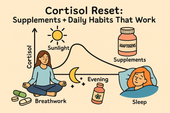
Cortisol Reset: Supplements + Daily Habits That Work
-
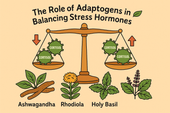
The Role of Adaptogens in Balancing Stress Hormones
Adaptogens work at the root of stress — your nervous system. 🌿 Learn how these powerful herbs help regulate cortisol, calm your nerves, and restore balance between energy and relaxation. ✨
-
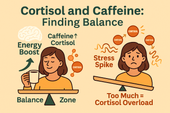
Cortisol and Caffeine: How Much Is Too Much?
Caffeine can boost energy and focus — but too much can overstimulate your stress hormones. ☕ Learn how caffeine affects cortisol, energy levels, and mood, and discover how to find the perfect balance for lasting calm and clarity. 🌿
-
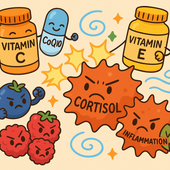
Antioxidants for Stress Management and Cortisol Control
When stress overwhelms your body, antioxidants come to the rescue. 🌿 Learn how vitamin C, CoQ10, and other natural compounds help reduce oxidative stress, regulate cortisol, and restore calm energy from within. ✨
-

Cortisol and Gut Health: How Probiotics May Help
Chronic stress doesn’t just affect your mind — it changes your gut. 🌿 Learn how cortisol disrupts the microbiome and how probiotics can help restore balance, improve digestion, and calm your stress response naturally. ✨
-

Vitamin D and Cortisol: Supporting Immune Balance
Vitamin D does more than strengthen bones — it helps regulate cortisol and support immune balance. 🌞 Learn how this essential hormone-like nutrient restores calm, improves mood, and strengthens your body’s natural stress defenses. 🌿
-
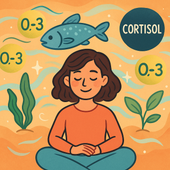
Omega-3s and Cortisol: Fighting Inflammation Naturally
Omega-3s are more than heart-healthy fats — they’re natural cortisol regulators. 🌿 Learn how EPA and DHA help reduce chronic inflammation, calm the nervous system, and support stress recovery from the inside out. ✨
-

High Cortisol and Belly Fat: Can Supplements Help?
Chronic stress can make belly fat harder to lose — but supplements like ashwagandha, magnesium, and omega-3s may help restore cortisol balance. 🌿 Learn how science-backed nutrients support fat metabolism, calm your stress response, and bring your body back into harmony. ✨
-

How Ginseng Can Support Energy and Cortisol Balance
Ginseng is one of nature’s most powerful adaptogens, helping your body handle stress without burning out. 🌿 Learn how this ancient root supports balanced cortisol, steady energy, and sharper focus — restoring vitality naturally and sustainably. ✨
-
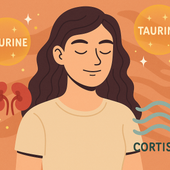
Taurine and Cortisol: Supporting Focus Under Stress
When cortisol surges, focus fades — but taurine helps restore balance. 🌿 Learn how this powerful amino acid calms your nervous system, regulates stress hormones, and sharpens concentration without jitters or fatigue. ✨
-

The Link Between Cortisol, Brain Fog, and Nutrient Deficiencies
When brain fog sets in, it’s not just in your head — it’s in your hormones. 🌿 Discover how cortisol imbalance and nutrient deficiencies like low magnesium, B vitamins, and omega-3s can cloud your focus and how restoring balance brings back mental clarity and calm. ✨
-

B Vitamins for Stress, Energy, and Cortisol Regulation
B vitamins are the foundation of stress resilience and steady energy. 🌿 Learn how this essential group of nutrients helps regulate cortisol, restore focus, and keep your nervous system calm — giving you balance from the inside out. ✨
-

Cortisol Imbalance and Chronic Fatigue: Can Supplements Help?
When chronic stress keeps cortisol high, fatigue and brain fog follow. 🌿 Learn how to rebalance your stress hormones naturally with calming nutrients, adaptogens, and lifestyle rituals that restore energy, focus, and inner peace. ✨
-

Adaptogen Stacks for Better Sleep and Lower Stress Hormones
Adaptogens can help your body recover from stress and sleep better by regulating key hormones like cortisol and adrenaline. 🌿 Learn how adaptogen stacks work to restore balance, calm the mind, and rebuild resilience — so you can rest deeply and wake renewed. ✨
-

Phosphatidylserine for Nighttime Cortisol Control
When stress hormones stay high at night, deep rest becomes impossible. 🌙 Discover how phosphatidylserine helps calm the brain, reduce nighttime cortisol, and restore healthy sleep rhythms — so you can wake up peaceful, clear, and recharged. ✨
-

Magnesium for Stress Relief and Cortisol Reduction
Magnesium is one of the most powerful natural tools for stress relief. 🌿 This essential mineral calms your nervous system, lowers cortisol, and helps your body recover from chronic tension. Learn how magnesium replenishes balance, improves sleep, and restores inner peace — naturally. ✨
-

Supplements to Improve Sleep by Balancing Cortisol
When cortisol stays high at night, sleep becomes a struggle. 🌙 Discover natural supplements that calm the nervous system, lower stress hormones, and restore your body’s natural rhythm. From magnesium and ashwagandha to L-theanine and phosphatidylserine, learn how to build deeper, more restorative rest. 🌿
-

Cortisol and Sleep: Why Stress Keeps You Awake
When stress keeps your body in fight-or-flight mode, cortisol refuses to calm down — and sleep becomes impossible. 🌙 Learn how elevated cortisol disrupts your circadian rhythm, suppresses melatonin, and turns restless nights into exhaustion. Discover how to restore balance and reclaim deep rest. ✨
-

L-Theanine for Cortisol Balance and Anxiety Relief
L-Theanine — the calming amino acid from green tea — helps quiet the mind and balance cortisol, the body’s key stress hormone. 🌿 Learn how it promotes calm focus, eases anxiety, and supports deep rest without sedation, backed by modern research and centuries of tradition. ✨
-

Rhodiola Rosea and Stress Resilience: A Natural Cortisol Regulator
Rhodiola rosea is one of nature’s most powerful tools for resilience. 🌿 This Arctic root helps balance cortisol, fight fatigue, and sharpen focus — keeping you calm yet energized even under stress. Discover the science behind Rhodiola’s adaptogenic power and how it helps your body thrive under pressure. ✨
-

Ashwagandha for Cortisol Balance: What the Science Says
Ashwagandha helps your body recover from chronic stress by calming the adrenal system and balancing cortisol — your key stress hormone. 🌿 Learn what science says about this powerful adaptogen, how it restores energy and focus, and why it’s one of nature’s most effective tools for modern stress relief. ✨
-

Supplements That Naturally Lower Cortisol Levels
When cortisol levels calm, your energy transforms — no more crashes or jitters, just steady focus and inner peace. 🌿 Learn which natural supplements and habits lower stress hormones, boost calm energy, and help your body thrive with balance instead of burnout. ✨
-

What Is Cortisol Imbalance? Symptoms You Shouldn’t Ignore
Cortisol — your body’s main stress hormone — keeps you alert and energized, but when it’s out of balance, it can drain your health. 🌿 Learn the signs of cortisol imbalance, from fatigue and anxiety to sleep disruption and stubborn weight gain, and discover how to restore calm, energy, and hormonal harmony naturally. ✨
-

The Best Daily Multivitamins for Menopausal Women
Menopause brings new nutritional needs that your old vitamin routine may no longer meet. 🌿 Discover how the right daily multivitamin can boost energy, balance mood, support bone and heart health, and keep your skin glowing. Learn which nutrients truly matter — from vitamin D to magnesium and B12 — to feel strong and vibrant every day. ✨
-

Antioxidants and Menopause: Fighting Inflammation Naturally
During menopause, oxidative stress and inflammation can quietly accelerate aging, fatigue, and skin changes. 🌿 Learn how antioxidants — from vitamins C and E to polyphenols in berries and green tea — help neutralize free radicals, reduce inflammation, and restore balance naturally. Discover the science of radiant, resilient aging. ✨
-

How CoQ10 Supports Heart Health After Menopause
After menopause, heart health becomes more important than ever. ❤️ Discover how CoQ10 — your body’s natural energy molecule — supports cardiovascular strength, restores vitality, and protects against oxidative stress. Learn how this essential nutrient helps keep your heart energized, balanced, and resilient through every stage of life. 🌿
-

Collagen Supplements for Skin and Joint Health Post-Menopause
After menopause, collagen loss affects both skin elasticity and joint comfort — but supplements can help rebuild from within. 🌸 Learn how collagen peptides, vitamin C, and other nutrients work together to restore firmness, reduce stiffness, and keep you glowing and mobile well into your next chapter. ✨
-

Calcium and Vitamin D: Protecting Bone Health in Menopause
Menopause brings hormonal changes that can weaken bones—but with the right nutrients, strength and stability can be rebuilt. 🦴 Learn how calcium and vitamin D work together to protect bone density, prevent fractures, and keep your body resilient. This guide explores nutrition, sunlight, and lifestyle habits that help your bones stay strong and vibrant for years to come. ☀️💪
-

Adaptogens for Energy and Resilience During Menopause
Feeling drained or emotionally scattered during menopause? 🌿 Discover how adaptogenic herbs like Ashwagandha, Rhodiola, and Ginseng can restore energy, balance cortisol, and build emotional resilience. Learn how these natural allies work with your body—not against it—to help you stay strong, focused, and calm through life’s hormonal changes. 🌸
-

Supplements That Help Beat Menopause Fatigue
Menopause fatigue can feel like more than tiredness—it’s a total energy crash. This guide explores how specific supplements, mindful breathwork, and therapy can help restore balance. Learn how nutrients like B vitamins, magnesium, and adaptogens rebuild your stamina, while breathwork and emotional healing calm your nervous system and bring vitality back to your days. 🌿✨
-

Herbal Blends for Menopausal Restlessness: Finding Calm in Transition
Herbal blends bring the wisdom of nature into moments of rest and renewal. Discover how soothing herbs like chamomile, lemon balm, and ashwagandha work together to calm menopausal restlessness, balance hormones, and invite deep relaxation. 🌿💫
-

Magnesium + Glycine for Deep Sleep During Menopause
Nutrients like magnesium, glycine, and B vitamins form the foundation for deep, restorative sleep during menopause. Discover how these natural compounds calm your nervous system, balance hormones, and help you wake up refreshed and recharged. 🌿💤
-

Melatonin and Menopause: Restoring Your Sleep Cycle
Nutrients are the foundation of hormone balance and energy. Learn how vitamins, minerals, and whole foods like greens, salmon, and berries nourish women’s bodies during menopause and beyond — restoring vitality, mood, and strength. 🌿🥗
-

How L-Theanine Helps With Menopausal Anxiety
Science continually deepens our understanding of the human body, from hormones to neurotransmitters. Discover how evidence-based research shapes modern wellness — bridging natural medicine, neuroscience, and hormone balance for healthier living. 🔬🌿
-

Can Ginkgo Biloba Improve Memory in Menopausal Women?
Hormone therapy can be a powerful tool for easing menopause symptoms and restoring balance. Learn how it works, the types available, and how to combine it safely with lifestyle and natural support for optimal well-being. 🌸💊
-

B Vitamins for Mental Clarity During Menopause
Nutrients are the foundation of mental and physical balance during menopause. Discover how vitamins, minerals, and whole foods like leafy greens, fish, nuts, and citrus can fuel energy, clarity, and calm while supporting hormonal health. 🌿✨
-

Mood Swings and Menopause: Natural Nutrient Support
Probiotics do more than support digestion — they help balance mood, hormones, and immunity too. Learn how a healthy gut microbiome can ease menopause symptoms, boost energy, and improve emotional resilience naturally. 🌿🦠
-

Brain Fog in Menopause: Supplements That May Help
Supplements can be powerful allies in restoring balance, energy, and focus—especially during menopause. Learn how nutrients like omega-3s, vitamin D, magnesium, and herbal adaptogens work together to support brain health, reduce stress, and promote lasting vitality. 🌿💊
-

Adaptogen Stacks for Reducing Night Sweats
Hormone detox isn’t about cleansing your body—it’s about restoring flow. Learn how the liver, gut, and endocrine systems work together to eliminate hormone buildup and how herbs like milk thistle, dandelion, and schisandra support balance, clarity, and natural vitality. 🌿💫
-

Cooling Menopause Symptoms with Herbal Support
Ashwagandha is one of nature’s most powerful adaptogens, helping women manage stress, sleep better, and balance hormones naturally. Discover how this ancient root supports calm energy, emotional resilience, and relief from menopause-related anxiety and fatigue. 🌿💫
-

Evening Primrose Oil and Menopause: What the Research Says
Hot flashes are one of the most common—and frustrating—symptoms of menopause. Discover what causes them, why the body’s “internal thermostat” becomes unbalanced, and the natural supplements and lifestyle shifts that can help you cool down, rest better, and feel more in control. 🔥💧
-

How Black Cohosh Helps with Menopausal Symptoms
Sleep disturbances are among the most exhausting symptoms of menopause—but they don’t have to rule your nights. Discover how natural strategies and calming supplements can help you fall asleep faster, stay asleep longer, and wake up feeling truly restored. 🌙💤
-

Natural Supplements That May Reduce Hot Flashes
Hot flashes can disrupt sleep, confidence, and daily comfort—but natural relief is possible. Discover the best research-backed supplements like black cohosh, red clover, and licorice root that may reduce hot flashes, balance hormones, and restore inner calm during menopause. 🌿💫
-

Omega-3s and Menopause: Supporting Mood and Inflammation
Omega-3 fatty acids are essential for hormonal harmony, brain function, and emotional balance—especially during menopause. Learn how these healthy fats reduce inflammation, support heart health, and restore calm, vitality, and focus through every stage of midlife. 🌊💫
-

The Role of Vitamin D in Menopausal Health
Vitamin D plays a powerful role in menopausal health—supporting bone strength, hormone balance, and mood stability. Discover how optimizing your vitamin D levels can improve sleep, energy, and emotional well-being while protecting long-term vitality through every stage of menopause. 🌞💪
-

Magnesium for Menopause: Relaxation, Sleep, and Hormonal Support
Self-regulation is the art of staying calm, centered, and in control—no matter what life throws your way. Learn how to strengthen emotional balance, manage stress responses, and cultivate inner peace through mindful techniques that reconnect your heart, body, and brain. 🌿💫
-

Can Adaptogens Like Ashwagandha Ease Menopausal Symptoms?
Brain fog during menopause can make even simple tasks feel overwhelming—but you’re not losing your sharpness, your hormones are simply shifting. Discover how adaptogens like ashwagandha and key nutrients can restore mental clarity, balance cortisol, and bring calm focus back to your day. 🌿🧠
-

Supplements That Support Hormonal Balance During Menopause
Herbal supplements have supported women’s health for centuries—and modern science is finally catching up. From ashwagandha and maca to red clover and rhodiola, discover how nature’s most trusted herbs can calm stress, balance hormones, and enhance energy through every life stage. 🌿✨
-

The Ultimate Motivation Stack: Supplements That Work Together
Discover how therapy helps restore motivation, focus, and emotional balance alongside supplement and mindset strategies. This empowering article explores how addressing thought patterns and emotional blocks through therapy can complement biochemical tools for long-term drive and well-being. 🧠💬


















































